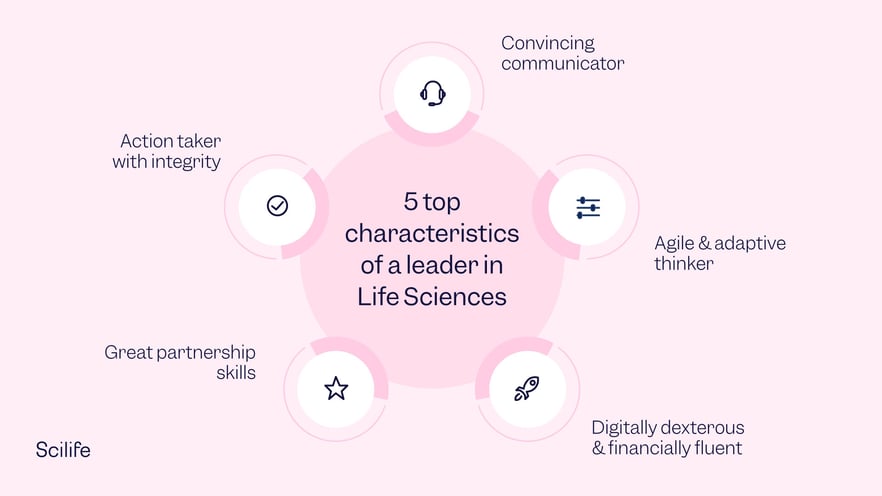
What actually makes a ‘good’ leader good, in a sector like the life sciences today? Leadership is not just a singular quality, of course. It’s the use of a whole rich skillset. The talent of being adept at multiple skills simultaneously. And not just any skills either. The essence of a good leader in these modern times, in any industry, can be boiled down to 5 distinct leadership traits. Those who possess the powerful combination of all five are the leaders that rise above the rest.
So, what are the top 5 characteristics of a good leader in our competitive life sciences landscape, and what are some useful tips to improve leadership skills? Let’s find out!
Top 5 leadership skills good leaders share

1. Convincing communicator
It goes without saying that charisma is magnetic. Truly memorable leaders in any industry are famous for their ability to inspire, above all else. People are simply more inclined to listen and follow someone who speaks confidently, with eloquence, and with compassion. That’s timeless, and it’s no different in the life science sector.
Sincerity is hard to fake, which is why a good leader is genuine when they communicate with those around them. A real leader doesn’t just inspire others with a vision, but walks the walk and leads by example. Great leaders are motivators that empower their team through their own honest and contagious enthusiasm, not through superiority or critique. The first out of the good leadership qualities is therefore being an open, clear, and convincing communicator.
2. Agile & adaptive thinker
Despite what some might assume, even the best of leaders aren’t without flaws. Perfectionism is not an essential leadership trait. It may even be counterproductive as it can lead to delayed decision-making, obsessive micromanaging or risk adversity. And that causes novel ideas to be ground to a halt before they have the chance to take off. What is a vital leadership skill is flexibility and having an adaptive mindset. That means being excellent at dealing with change. Not just being able to cope with change, but actively preparing for it, and embracing change when it happens. Great leaders actually strive to seek out positive change in their journey of continuous improvement.
All good leaders are also quick problem solvers. Whether it’s knowing what issue to delegate to who, or tackling it head on by themselves, true leaders rarely hesitate in facing problems. An adaptive leader expects the unexpected, and usually has a strategy in place to deal with potential issues - or is fast at creating one.
Speaking of strategy, a strong leader in the life sciences is a natural tactician. Such a leader knows how to organize their company, people and processes to optimize the performance of each and therefore the business as a whole. Usually, this means implementing a structured yet agile way of working to prevent chaos and increase efficiency and productivity in their teams. A successful leader sets clear achievable goals and expected outputs, knows what input is required from them (and when), and above all knows when to get out of the way!
As a matter of fact, great leaders usually don’t oversee or manage every process and every employee, supplier, etc, themselves. They are highly skilled at spotting talent and delegating to these individuals. An important leadership trait is knowing one’s own weaknesses - and hiring help where it’s needed! For example, if a leader isn't the best planner themselves, they’ll find someone who is and let them take care of it. A valuable leadership quality is the ability to let go and trust others to handle tasks with little guidance. This not only saves a leader tons of time which can then be invested in bigger priorities, but empowers employees to perform at their very best. A win-win!
3. Digitally dexterous & financially fluent
We live in the digital era. There’s no way around it, any modern-day leader must be tech-savvy. Don’t worry, it’s not about knowing all the ins and outs of every program and software tool out there - it’s about having a certain eagerness to experiment with cutting-edge tech, to be a fast learner, a quick adopter, and to have an eye for where tech may help automate. It’s to be digitally dexterous.
Any leader worth their salt must also have a high level of financial and business understanding. Again, it’s not about detailed accountancy knowledge, but it is about having a solid grounding in budgeting, quarterly business reviews, financial risk-taking, investing, and so on. Capital is the foundation of any business, so the knowledge and ability to allocate, manage and grow funds is imperative.
4. Great partnership skills
Being an able delegator was mentioned earlier, but a true leader goes beyond that. They’re good networkers, actively seeking to partner up on all fronts, whether it's with their own teams, investors, suppliers or even competitors. A ‘lone wolf’ mentality doesn't serve an aspiring leader well. Essential leadership skills in complex industries like the life sciences must include the willingness to share decisions, a certain know-how of business development in the sector, and a feel for PR with the outside world.
Again, authenticity here can’t be faked. Nevertheless, it can be trained. To improve leadership skills, developing and practicing partnership skills and adopting a helpful mentor mindset is a great place to start. In the end, although leadership traits may come more naturally to some, all good leadership qualities can be trained through practice, practice, practice.
5. Action taker with integrity
The last of the five top characteristics of a good leader is being an action-taker. That means decisiveness, doing what needs to be done - not just talking about it. Taking action doesn’t mean jumping the gun and leaping into the unknown either - forethought and planning is always needed, but there has to be a constant push forward that results in some form of action.
An important leadership skill we touched upon earlier is having authenticity and integrity, and that also applies to taking action. Taking the required steps forward, and then fully owning those decisions, come what may.
Tips to improve leadership skills
Flex those leadership muscles! The best way to get better at anything is to practice. Begin by identifying these 5 leadership traits we’ve described within yourself, and hone in on where they might need improving. Then get to work! It helps to ask outsiders to provide some feedback here, as we’re often biassed self-observers. The best people to turn to about your leadership skills would be the ones you actually lead, which is an extremely insightful (but understandably daunting!) exercise. As long as you value true honesty and don't punish less than stellar feedback, this is a great way to identify starting points. Did we mention bravery is a leadership trait? If that route is too scary, attending leadership development courses with a trained coach is a great place to begin opening up and getting to know yourself in the context of being a leader.
What’s certain is that all leaders in this fast-evolving digital landscape must strive to improve themselves every day, before setting about improving processes around them. Successful life science organizations will undoubtedly look very different in the future than they do today, and those that lead them must keep up.

